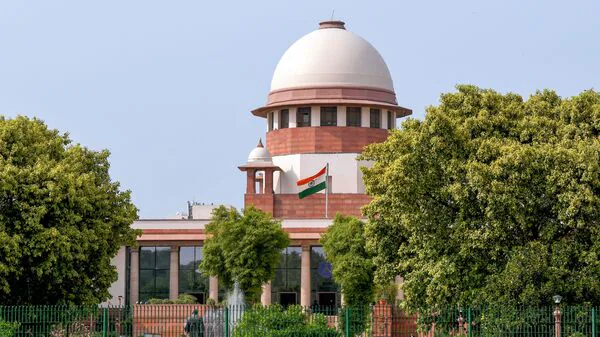
Spectre Of Delays In Economic Bills Returns With SC Ruling? Experts See Checks And Balances
NEW DELHI: A Constitution Bench of the Supreme Court on Thursday held that courts cannot impose timelines on the President of India or state governors to approve bills passed by state legislatures, while urging them to respond promptly.
The five-judge bench led by Chief Justice B.R. Gavai said its earlier judgment, which had introduced fixed timelines and suggested that bills could be treated as automatically approved if constitutional authorities delayed action, was incorrect. Such directions, the bench said, take away powers that the Constitution gives only to the President and governors.
Other judges on the Bench were Justices Surya Kant, Vikram Nath, P.S. Narasimha and Atul S. Chandurkar.
Also Read | Govt awaits SC order before final call on Vodafone Idea relThe ruling is likely to influence how impasses between state governments and governors over bill approvals are resolved and opens up the possibility of delays over bills in states relating to economic, business, financial, and infrastructure domains, among others.
Like, for instance, Tamil Nadu's Online Gambling Prohibition Bill. Passed in October 2022, the bill remained in limbo for months, leaving the gaming industry in uncertainty until assent was finally granted in April 2023.
Legislative delays?The ruling comes as several states are struggling with delayed assent to important laws, slowing commercial and economic reforms and creating uncertainty for industries and investors.
Under Articles 200 and 201, governors and the President hold the discretion to approve or withhold assent, but long periods of inaction have stalled policies relating to online gaming, industrial land rules, power tariffs and urban development.
In Punjab, multiple bills passed in 2023, including those dealing with municipal administration and electricity reforms, were held up for months, delaying tariff decisions and slowing infrastructure planning until the Supreme Court intervened.
West Bengal saw a similar pattern. Governor C.V. Ananda Bose approved the Bengal Taxation Tribunal (Amendment) Bill, 2022, the West Bengal Town and Country Planning (Amendment) Bill, 2023, the West Bengal Land Reforms and Tenancy Tribunal (Amendment) Bill, 2022, and the West Bengal Taxation Tribunal (Amendment) Bill, 2022, finally in April 2025.
Also Read | MNCs can claim tax benefits even without active contracts, SC ru“These examples show how delayed assent has become a major bottleneck for state-level economic policymaking," said Rishabh Gandhi, founder, law firm Rishabh Gandhi and Advocates.“A bill may be passed with fanfare, but until the assent comes, it has the legal force of a press note. For commercial sectors that depend on regulatory certainty, this limbo can be more damaging than delays in tenders or approvals."
Deemed assentThe court struck down the idea of“deemed assent"-treating a bill as approved if a governor or the President does not act within a specified time-calling it a constitutional fiction. According to the court, this would undermine the separation of powers and distort the country's federal balance.
The judgment restores full discretion to the President and governors during the assent process. Courts can step in only where there is an extreme or clearly unreasonable delay that disrupts the legislative process, and even then, they can merely direct governors to make a decision. They cannot look into the merits of the bill.
The court, however, clarified that governors cannot keep bills pending for long or block them by doing nothing. They must act quickly and either approve the bill, return it, reject it, or send it to the President for consideration. They cannot sit on it indefinitely.
A legal expert read the ruling as leaving the onus on governors to take decisions on bills without inordinate delays.“Governors no longer have the luxury of sitting on bills indefinitely. The mandate of the legislature must prevail, and the Supreme Court has now made it clear that a governor has only three constitutionally valid options: return the bill to the legislature, refer it to the President, or take a decision within a reasonable time. If none of these steps are taken, courts can ask the governor to decide," said Suchitra Chitale, managing partner, law firm Chitale & Chitale Partners.
Another lawyer echoed this view. Parth Contractor, founder, law firm Chambers of Parth Contractor, said he does not see this as a structural problem.“Things have broadly moved well. These issues usually arise only when political considerations come into play. Ultimately, both sides know how to manage their positions."
Governments' predicamentThe case stems from a long standoff between the Tamil Nadu government and governor R.N. Ravi, as several bills remained pending for long periods without being approved, returned, or sent to the President. The state government argued that this inaction was blocking governance.
In April, a two-judge bench of Justices J.B. Pardiwala and R. Mahadevan said that although the Constitution does not specify timelines, a governor cannot use silence to stall an elected government. The judges laid down time-bound steps for decision-making.
Also Read | Mint Explainer | Why the Supreme Court ordered a real estate cleanPresident Droupadi Murmu later sought clarity through a Presidential Reference. The matter was argued before the Constitution Bench over ten days, and judgment was reserved on 11 September. A Presidential Reference under Article 143 allows the President to seek the Supreme Court's opinion on questions of law or issues of public importance.
The larger Bench clarified that it was not striking down the earlier Supreme Court ruling in the Tamil Nadu-governor dispute; instead, it only clarified the correct constitutional position for future cases, since the President had not asked the court to annul or overturn the previous judgment.
Legal Disclaimer:
MENAFN provides the
information “as is” without warranty of any kind. We do not accept
any responsibility or liability for the accuracy, content, images,
videos, licenses, completeness, legality, or reliability of the information
contained in this article. If you have any complaints or copyright
issues related to this article, kindly contact the provider above.


















Comments
No comment